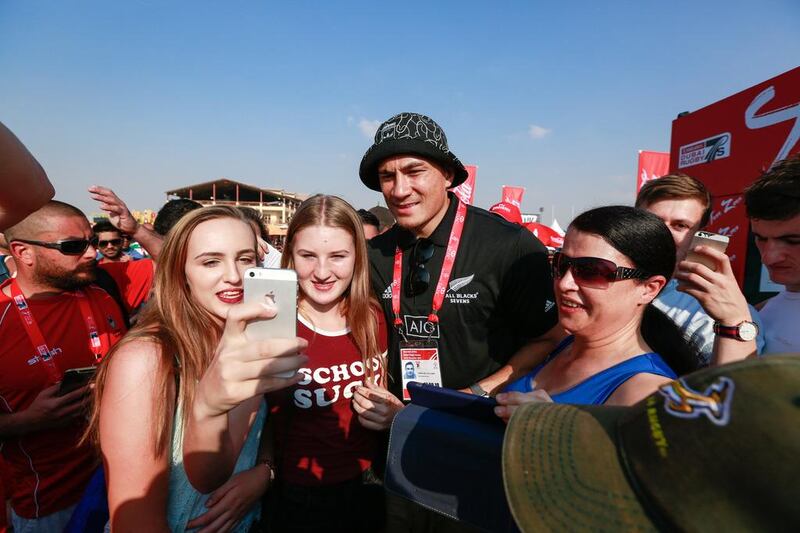Gavin Hastings, the former Scotland captain, is not the first person to make the comparison. “Like Twenty20 [in cricket],” Hastings said in Dubai last week, “sevens is the vehicle to spread rugby worldwide.”
So far, so conventional. The means by which he would do so, though, requires a radical overhaul of the prevailing system, which is driven by a focus on international representative teams.
Replace the current world series with privately-owned franchises in 16 destination cities. Draft players from a global marketplace. Each would be obligated to teach the game in schools in their downtime from playing tournaments.
“Having a Dubai franchise would be amazing,” Hastings said. “Having a final where there were six Fijians battering each other, would be amazing.
“It would be incumbent on each of the franchise owners to make it the biggest and best event possible. I don’t think there is any downside to it.”
All of which sounds exciting. But could it work?
The Indian Premier League is often seen as the benchmark for transforming and monetising a sport. Hastings himself cited it when explaining his idea.
Lalit Modi’s billion-dollar baby hit on a perfect formula for a captive market. A wealthy central board. Cash-rich, publicity-craving backers falling over themselves to associate with it. Over a billion potential sets of eyeballs eager for as much cricket as possible, in the quickest format possible.
And, crucially, the best, most recognisable players in the game, many of whom – like Sachin Tendulkar, MS Dhoni, and Shane Warne – are brands in their own right.
IPL was the ultimate get-rich-quick sporting initiative. And, 10 years after its inception, it is still growing apace. But cut and pasting its model is not a guarantee of success, either in cricket or elsewhere.
The time to gather your herd is here! Act now and grab your seats for this year's #Dubai7s #RunWild https://t.co/7hQIPc5CLC pic.twitter.com/EvmufxxjRU
— Dubai Rugby Sevens (@Dubai7s) October 19, 2017
Does sevens actually have that same celebrity culture, or even the craving for it? We might know the likes of Waisale Serevi, Ben Gollings, DJ Forbes, and Cecil Afrika, mainly because we have been lucky enough to see them close up in Dubai down the years.
But does their appeal go beyond rugby’s confines? Are sports fans who are ambivalent about the oval ball game going to buy tickets, or a TV subscription, based on the fact some leading sevens players are involved?
The IPL model would require household names from the XVs game to supplement the sevens regulars. The appearance on the world series of Sonny Bill Williams, Quade Cooper and Bryan Habana in the lead up to the first Olympics caused a spike in interest.
Or the quality of the competitive action would have to sell itself. Which is why sevens does not need to follow the IPL-celebrity model. Sevens can have broad appeal, even without the presence of superstar players.
Ben Ryan, the coach when Fiji won the first Olympic sevens, subsequently spent a year in various consultation roles, including at the New York Knicks NBA side. He was shocked to find the multimillionaire basketball players knew who he was. The Olympic sevens, it turned out, had been a big TV hit.
The gold medal match had the largest global TV audience of any rugby match. One independent report suggested sevens saw the biggest growth of all the sports at Rio 2016. Of the 17 million new fans that were reportedly created, France, the UK and the US had the most.
Which brings the conversation to the US market, which is often regarded as the golden ticket for global sports. (Hastings himself played a season in NFL Europe after his rugby career finished.)
It's wild, it's fierce, it's the #Dubai7s #RunWild https://t.co/SPlHi4XF2p pic.twitter.com/8TZYLzFKeQ
— Dubai Rugby Sevens (@Dubai7s) October 6, 2017
Is rugby on the brink of cracking America, via its abridged format? Could the franchise model help speed the progress?
The World Cup Sevens is being staged in San Francisco next year. US sevens coaches have always been happy to gather up players who have fallen through the cracks of athletics, or NFL. That flow has gathered pace with the sport’s admission to the Olympics, and the US finished fifth on the world series last year.
And now, a professional sevens league is planned for the US, along similar lines to the one proposed by Hastings, albeit with a morphed format.
“We want to extend our interest beyond just rugby fans,” David Niu, the president of Super Sevens Rugby said.
“We want to attract the American sports fan. If we can achieve this goal, we can contribute to the growth of the sport in the US across a number of critical pillars from Main Street to Wall Street.”






